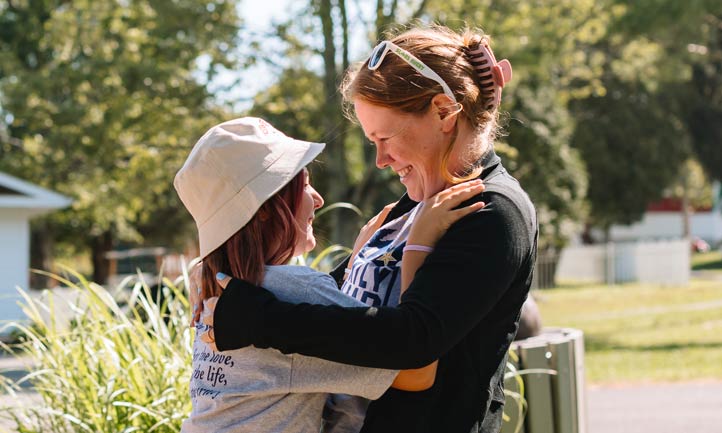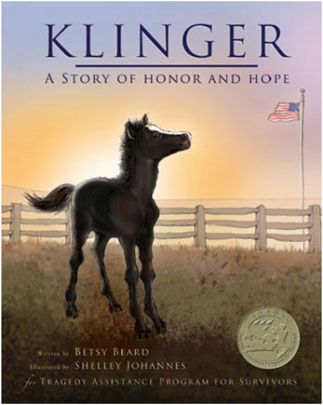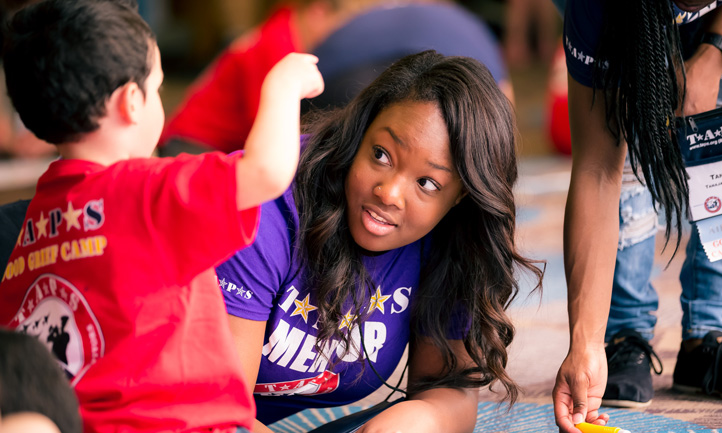Klinger's Korner: Controlling What You Can - Attitude
Author: Andy McNiel
The fall season brings with it several transitions each year. Most of us see a change in the weather, temperature, and natural environment. Many will experience the change of colors as the leaves burst with orange, red, and brown. Others may have a slight shift from the heat of summer to more moderate temperatures of fall. Children and teenagers transition back into a structured school schedule — homework, after-school activities, and earlier rising and bedtimes. Fall largely brings welcomed changes, but sometimes change can come with challenges.
For children and teenagers grieving the death of a family member or friend, the transition back to school can, sometimes, be challenging. They may struggle with concentration, focus, or motivation. The change in seasons may bring back memories of things they did with their person before they died during this time of year. Grief is not something that children or teenagers can easily plan for or control. So, they will often struggle with the lack of control they have over grief’s impact on their lives as they transition back to school.
Yet, there are many things that children and teenagers can control. As parents and guardians, we can help them become more aware of their choices, provide options for them so they have a “say so” daily, and model for them that the greatest choice we make — even in our grief — is choosing our attitude. Here are three lessons to teach and model for your children as they transition into the fall season.


You Have Options
We can help our children learn that, though there may be things in our lives we cannot fully control, we still have options. At times, we all struggle with over-focusing on things we cannot control. Sometimes we do this to an extreme and focus only on those things. When our attention is solely on what is going wrong or what is not in our control, we often lose sight of what we can control. We can remind ourselves and our children that even in the worst of times, we still have options. For example, we can choose how we spend our time in the afternoons after school — join an after-school activity, play outside with friends, read, spend time together as a family, or support someone else going through a difficult time. If we put our minds to it and look for opportunities, we begin to see them all around us.
Your Choices Matters
Sometimes in our grief, we might believe that, since we cannot control whether bad things will happen, our choices do not matter at all. The reality is that our choices always matter, and they matter even more when we are going through a difficult time. Viktor Frankl was a psychiatrist who survived the WWII death camps, but lost almost every member of his immediate family. He wrote, “When we are no longer able to change our situation, we are challenged to change ourselves.” What he meant by this is that even in the most challenging of circumstances, we can choose how we spend our time, what we pay attention to, and who we spend time with. We can model this for our children by making healthy choices for ourselves, even during our grief.
Your Attitude Is Your Choice
Viktor Frankl also wrote that the greatest human freedom is “to choose one’s attitude in any given set of circumstances, to choose one’s own way.” This is not always easily done, especially when we are grieving. This amount of self-control takes practice. We can start by practicing this through self-talk with a trusted friend, through journaling and getting some thoughts and feelings on paper, or by focusing on our breathing, calming ourselves as we look for those things around us that we can control. Our children are paying attention to how we are responding to the circumstances of life and our grief. As we learn to control our attitude, we can teach them how to do the same.
Family Activity
Weekly Schedules, Rituals, and Routines Activity

Use back-to-school time as an opportunity to make plans as a family. Remember, how you spend your time each week is your choice. You can let the days come and go, only facing whatever each day brings, or make some choices about how you spend your time each day.
Set a time to sit down with your children and plan your weekly schedules, rituals, and routines. Lay the poster board on the floor in the middle of the room. Give each of your children and teenagers three sticky notes. Ask them to write an activity they look forward to or enjoy doing on each sticky note. Then, without talking, have them place their sticky notes on the poster board. Go around the room and have each person share or point out their sticky notes and why that is something they like. When everyone has shared, then group similar sticky notes together. This should give you several activity themes you could plan to do together on a weekly or biweekly basis. For example, you might designate one night a week as movie night and another as game night. On other evenings, you might visit a special location, like a nearby park. Let each of your children or teenagers share input. You can then work with your children to draft a weekly routine on the poster board and post it somewhere in the house for all to see.

Klinger, A Story of Honor and Hope
Based on Klinger, a real horse that serves in the U.S. Army Caisson Platoon in Arlington Cemetery, Betsy Beard’s Klinger is an endearing story written for TAPS honoring all of America’s beloved fallen heroes. The children’s book illustrates a young horse dreaming of fame as a racehorse, struggling to achieve his dreams, and then finding fulfillment in honoring fallen heroes and bringing comfort to their families. A journey of loss, grief, and hope, Klinger is a wonderful and helpful book for young children experiencing grief over the death of a military loved one. Learn more about the book Klinger, A Story of Honor and Hope.

TAPS Youth Programs
TAPS Youth Programs provide safe spaces for surviving children to honor their loved one and explore their grief all while experiencing fun, adventure, mentorship, and camaraderie with peers, mentors, and caring professionals.
Visit TAPS Youth Programs to learn more and browse events, including Good Grief Camps, family campouts, and online groups and workshops.
Andy McNiel, MA, is the Senior Advisor, TAPS Youth Programs.
Photos: Pexels.com, Pixabay.com and TAPS Archives
